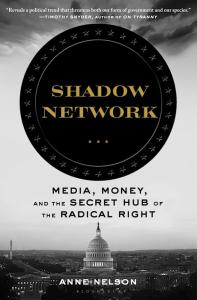Once upon a time there was a small group of political and religious fanatics who didn’t like the direction the nation was trending, either in terms of its political leadership or in its cultural focus. This group of fanatics banded together, founded friendly media outlets, organized political campaigns, and started a movement that would eventually affect the politics and culture of the whole nation. By leveraging key issues, they turned out votes disproportionate to their actual numbers and managed to seize the reins of power. I am talking of course about Thomas Jefferson, James Madison, and the founders of the Democratic Party. Or maybe I’m talking about Henry Clay and Daniel Webster and the creation of the Whig Party. Or maybe John Fremont and Abraham Lincoln and the Republican Party. Or any of the numerous shifts that have been organized within both of the two parties since then (FDR, LBJ, Bill Clinton, or Obama re: the Democrats; TR, Eisenhower, Nixon, Reagan, W., and Trump re: the Republicans).

The point is that there is a way to tell these stories that suggests a sinister plot to overthrow all that is good and right in the nation and prevent the development of what is good. If you want to read such a narrative about one part of the contemporary American right, pick up Anne Nelson’s book Shadow Network: Media, Money, and the Secret Hub of the Radical Right.
If your initial thought on hearing the title “Shadow Network… Secret Hub” is that if someone has written a 400+ page book about something it probably isn’t all that secret or shadowy, you’re not the target audience here. For that matter, I’m not really the target audience here either (then again I’m not the target audience for much these days). Still, I think this is a good book that those interested in trends in American politics–especially Christians–would do well to read.
Focusing primarily on the “Council for National Policy” (a loose association of “the country’s most influential conservative leaders in business, government, politics, religion, and academia to hear and learn from policy experts on a wide range of issues”, or so their website says), Nelson follows its development and rise in influence over the past few decades. She also discusses the growth of (conservative) talk radio, political strategists and pundits, think-tanks, legal foundations, and other assorted developments and trends on the right–especially those involving religious figures and entities–from the 1980s until the present. She argues that these conservatives have been engaged in a persistent effort to topple the American system in favor of their vision of a nation where they rule.
Clearly where Nelson sees conspiracy and plotting, I see organization, campaigning, and, you know, the sorts of things you’d expect to see in a free society where people can be influenced and minds can be affected. Which isn’t to say we disagree on the facts–as far as I could tell, she didn’t say anything major in this book that was factually untrue. Our differences are primarily over interpretation more than anything specific. I suppose she and I might disagree on how ‘shadowy’ all this has been–in my view, the right has been very open and clear about their plans and goals up until a few years ago. Six years ago (did something happen in 2016? I’m forgetting now… [sarcasm, for those who can’t tell]) that changed a bit as the right went from having a somewhat clear and coherent vision (whether a worthwhile one or not is a different conversation) to stumbling around incompetently on the public stage. But that’s still not attributing any secrecy to them–“we care about these issues, are going to try to convince you that we’re right, and win elections accordingly” has been pretty consistent from both sides of the American political aisle. (And no, conservatives aren’t immune to charges of ‘conspiracy’ either, and have the unfortunate tendency to believe bigger conspiracy charges than Nelson makes here with much less evidence than she presents for her own case.)
As I said, I think this is an important book for Christians especially to read, if only because this is how we are perceived. Right or wrong this is how the other side views us, and we need to take that into account when engaging in the public square.
More importantly, we need to be careful not to do to others what has been done here to us: when discussing those with whom we disagree politically, we need to be careful to present their views as if they were well-intentioned, concerned for the common good, and intended to achieve a society that is healthier for everyone involved. Too often Christians (especially those of us who are political conservatives) make the mistake of caricaturing our opponents rather than giving them the benefit of the doubt and engaging with their ideas as citizens of the same republic. At no point in this book does Nelson wrestle with the question of whether or not conservatives might have a valid argument, or a genuine concern for what’s going on in society, or the desire to see others flourish (though she does occasionally grudgingly note the charity work that right wing organizations engage in). We are obligated to speak with and about each other decently and civilly, even when we disagree on fundamental principles–and perhaps especially when we disagree on something as unimportant as politics. Shadow Network is a useful book both for details about what has happened on the right over the past 40 years, and as a model to inspire thought about how we can and should be speaking about each other in public.
Dr. Coyle Neal is co-host of the City of Man Podcast an Amazon Associate (which is linked in this blog), and an Associate Professor of Political Science at Southwest Baptist University in Bolivar, MO












